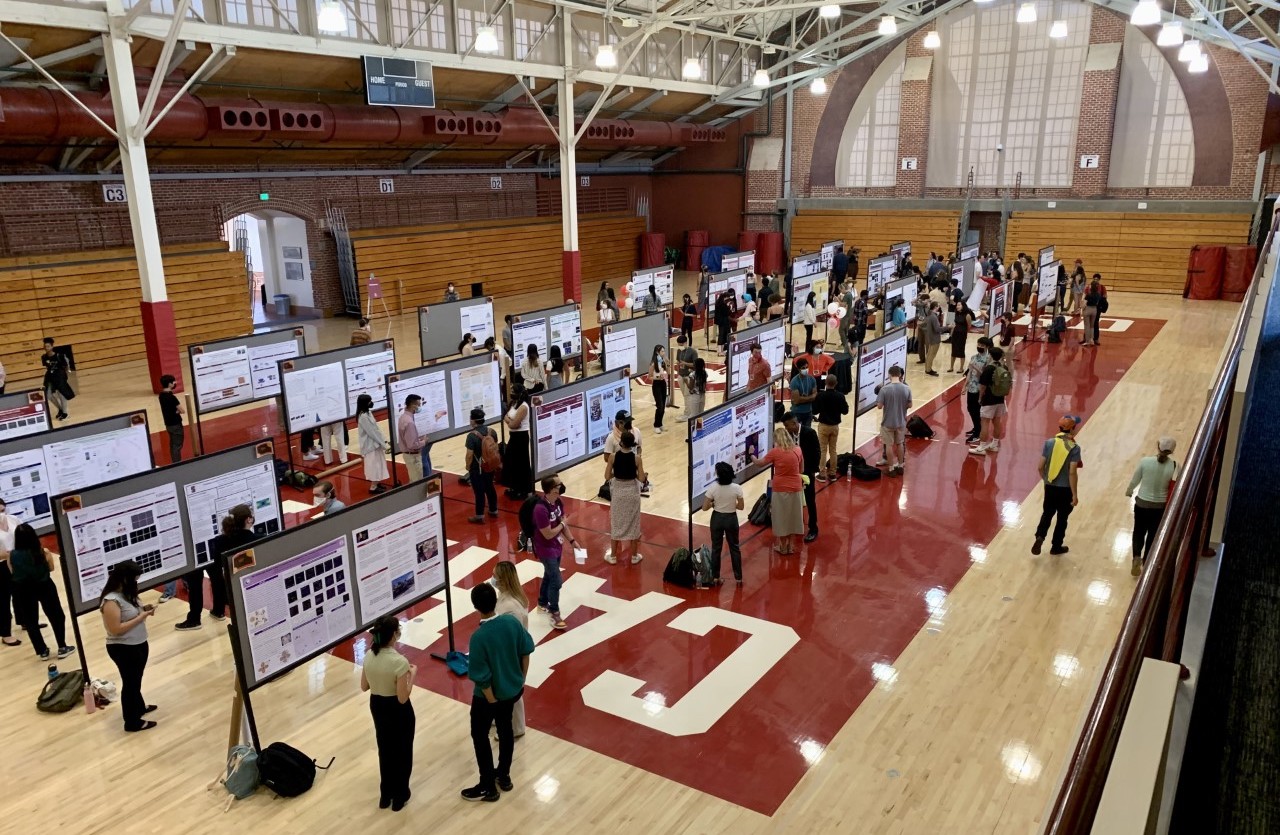Symposium of Undergraduate Research and Public Service (SURPS) returns to in-person signature event
More than 100 students presented their research and service projects at the annual gathering, which coincides each year with the start of Stanford’s Alumni Reunion Weekend.

Image credit: Eric Van Danen
A diverse cross-section of the Stanford community—from faculty and staff to fellow students and alumni who had returned for Reunion Weekend—came together at Burnham Pavilion on Thursday, Oct. 20, to celebrate more than 100 student undergraduate research and public service presenters in the first in-person fall Symposium of Undergraduate Research and Public Service (SURPS) event since 2019.
Each year, the SURPS event offers students from all disciplines the opportunity to present their current and recent academic projects, showcasing the variety of topics, approaches, and interests at Stanford. The symposium also serves as a resource for undergraduates who can learn how fellow students developed their intellectual interests, current projects and faculty or community connections. A comparable spring event—the April Symposium of Undergraduate Research and Public Service (ASURPS) event—is held during Stanford’s Admit Weekend.
“SURPS is a really impactful event in different ways for the Stanford community as a whole,” said Brian Thomas, senior director of Undergraduate Research. “In some ways, this is the day that makes the rest of the year’s work so well spent.”
“As I tell both current and admitted students each year, SURPS is an opportunity to hear a hundred different answers to the questions ‘What are you curious about?’ and ‘How did you get started?’”
Parth Sarin, a senior majoring in public policy who was among the dozens of students presenters, noted, “The energy in this room is really exciting! I’m standing next to other students with totally different projects. There are threads and ideas from those projects that I can apply to my project too.” Sarin was presenting his research on teaching artificial intelligence and exploring algorithmic bias in high schools. “We are trying to address ‘How can we make computer science more interdisciplinary; how can we center equity and justice more in the teaching of computer science (CS); and how can we make CS more locally relevant?’”
Megan Rogers, a senior majoring in human biology, presented her public service research on leveraging the pharmaceutical supply chain for massive healthcare affordability. As part of Cardinal Quarter, she spent her summer working at a nonprofit organization based in Palo Alto, which helps health facilities and pharmacies donate unused medicine to community partners that dispense to patients who wouldn’t otherwise have access. “I wanted to explore public service through medicine because I wanted to understand the business side of the medical sector to help me make a decision about what I want to do in that space,” Rogers said. “It was a really great way to figure out what kind of an impact I would want to have in the future.”
For junior Sophia Pribus, her undergraduate research project has been one of the highlights of her academic journey. A biomedical computation major, Pribus has been researching the influence of primary breast cancer hormone receptor status on metastasis to the central nervous system. “I’ve been working on this project for a couple of years. It exposed me to a new area of research that I did not know anything about. Now that I’ve done this project, I’m completely influenced to pursue translational research—research that directly incorporates patient data into the research design and into the studies’ goals.”
SURPS is sponsored by Undergraduate Research and the Haas Center for Public Service, both part of the Office of the Vice Provost for Undergraduate Education (VPUE). Many of the event’s 100-plus presenters and projects can be seen in this Instagram video.